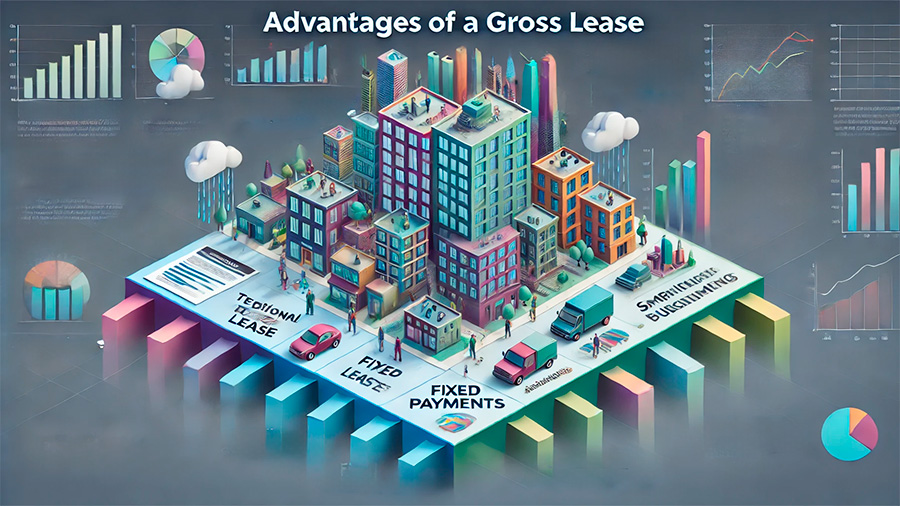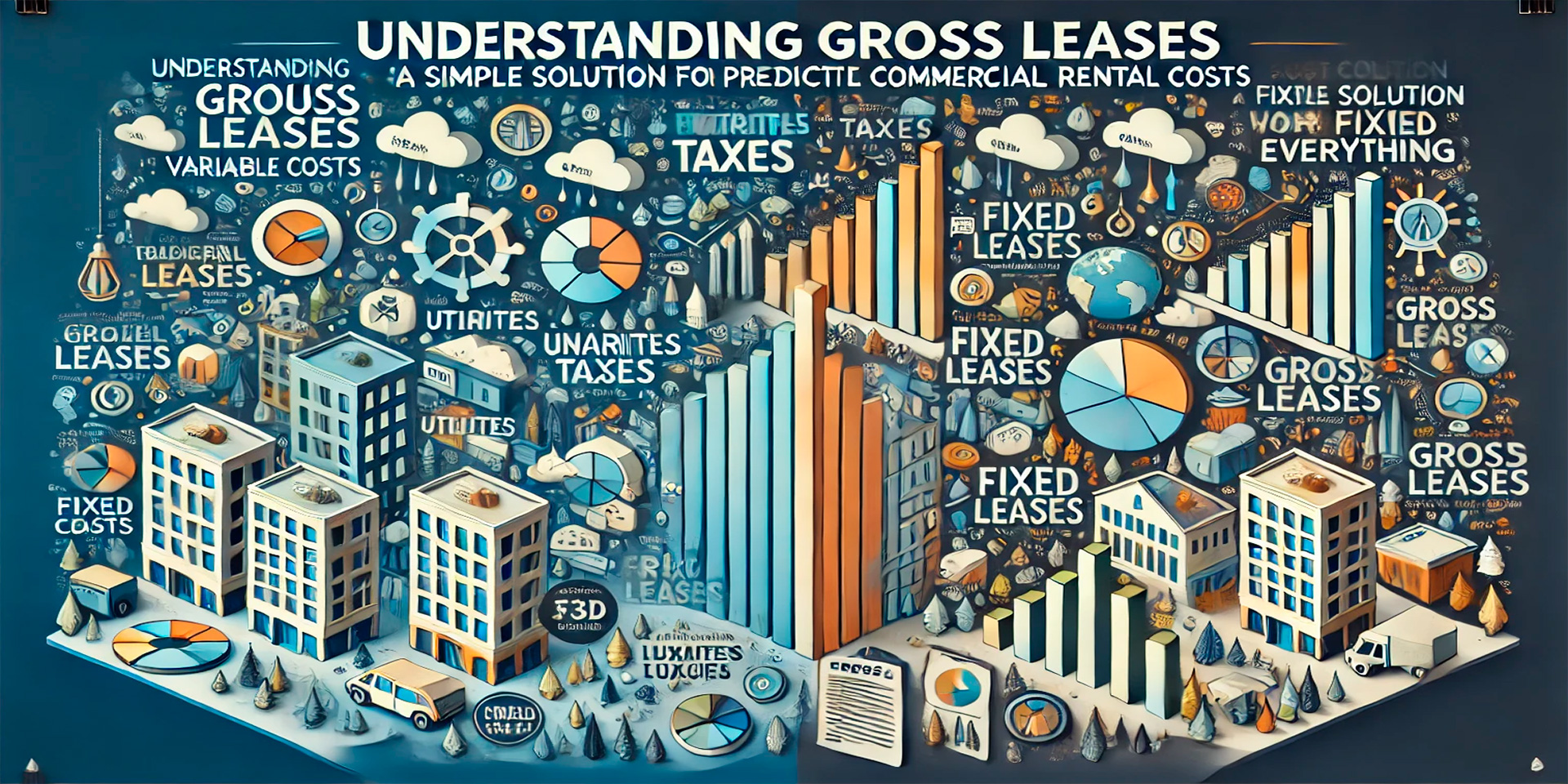A gross lease is a common type of commercial lease where the tenant pays a fixed rental amount, and the landlord is responsible for covering most, if not all, of the operating expenses associated with the property. This arrangement offers simplicity and predictability for tenants, making it an attractive option for businesses that want to avoid the uncertainty of variable expenses. In this article, we’ll explore how a gross lease works, what costs are included, and whether it might be the right leasing option for your business.
Understanding a Gross Lease
In a gross lease, the tenant agrees to pay a fixed monthly rent, and the landlord covers the majority of the property’s operating costs. These expenses typically include property taxes, building insurance, and maintenance costs. Because the landlord assumes responsibility for these costs, the tenant benefits from a stable and predictable rental payment throughout the lease term. This can be particularly advantageous for businesses that need consistent budgeting without the risk of unexpected expenses.
The structure of a gross lease contrasts with other types of commercial leases, such as net leases, where tenants are responsible for additional costs beyond the base rent. With a gross lease, the simplicity of having one fixed rental payment simplifies financial planning and eliminates the need for the tenant to monitor and manage variable expenses like utilities, repairs, or property taxes.
What Costs Are Included in a Gross Lease?
While the specific terms of a gross lease can vary depending on the agreement, the following costs are typically covered by the landlord in a standard gross lease:
- Property Taxes: The landlord pays the local property taxes assessed on the building.
- Building Insurance: The cost of insuring the building and covering any liability or damage to the property is the responsibility of the landlord.
- Maintenance and Repairs: The landlord covers the cost of maintaining common areas, such as hallways, lobbies, elevators, and parking lots, as well as routine repairs to the building’s structure and systems (e.g., HVAC, plumbing).
In some cases, gross leases may also cover utilities such as water, electricity, and heating, but this depends on the terms of the lease. It’s essential for tenants to carefully review the lease agreement to understand exactly what costs are included.

Advantages of a Gross Lease
For many tenants, a gross lease offers several key advantages that make it an appealing option for commercial leasing. From predictable expenses to simplified management, these benefits can help businesses focus on their core operations without the distraction of managing building-related costs.
Predictable Monthly Expenses
One of the primary advantages of a gross lease is the predictability it offers. Since the tenant only pays a fixed rent amount each month, there are no surprises when it comes to budgeting for operational costs. This can be especially helpful for businesses that need to maintain tight control over their cash flow. With a gross lease, tenants can accurately forecast their rental expenses and avoid unexpected increases in building-related costs.
Simplified Management
A gross lease also simplifies the management of the property for tenants. Since the landlord handles the responsibility for property taxes, insurance, and maintenance, tenants don’t have to worry about coordinating repairs, paying property-related bills, or managing the upkeep of shared areas. This allows tenants to focus on running their business without the added burden of managing building expenses and logistics.
Reduced Risk of Unexpected Costs
Because the landlord assumes responsibility for the building’s operating costs, tenants in a gross lease are protected from unexpected expenses that could arise due to property tax hikes, insurance rate increases, or major repairs. In other types of leases, such as net leases, tenants may be required to contribute to these expenses, which can fluctuate significantly year to year. A gross lease shifts this risk to the landlord, providing tenants with more financial stability.
Disadvantages of a Gross Lease
While gross leases offer simplicity and predictability, they also have some potential drawbacks. It’s important for tenants to carefully weigh these disadvantages to determine if a gross lease is the best option for their business.
Higher Base Rent
Since the landlord is covering the building’s operating expenses, the base rent in a gross lease is often higher than in other types of leases, such as net leases. Landlords typically factor these costs into the rent to ensure they can cover taxes, insurance, and maintenance. While this simplifies the tenant’s monthly payment, it may result in a higher overall rental rate compared to a lease where the tenant assumes responsibility for some of the additional costs.
Lack of Control Over Building Expenses
In a gross lease, tenants don’t have direct control over how building-related expenses are managed. For example, the landlord may decide when and how repairs are made, and the tenant may have little say in decisions about building maintenance or improvements. In some cases, tenants may feel that they are paying more than necessary for building expenses, especially if the landlord isn’t actively working to minimize costs.
Potential for Rent Adjustments
While the rent in a gross lease is fixed for the lease term, some gross leases include clauses that allow landlords to adjust the rent if operating costs rise significantly. For instance, if property taxes or insurance premiums increase unexpectedly, the landlord may have the option to pass these costs on to the tenant in the form of a rent adjustment. It’s important to carefully review the lease agreement to understand whether any provisions for rent adjustments exist and under what circumstances they may occur.

Is a Gross Lease Right for Your Business?
Deciding whether a gross lease is right for your business depends on your specific needs, financial goals, and how much risk you are willing to take on regarding fluctuating building expenses. A gross lease may be the ideal option for businesses that prioritize simplicity, predictable costs, and minimal involvement in property management. However, businesses looking to minimize rent costs and have more control over operating expenses might prefer a different type of lease, such as a net lease.
Consider Your Business’s Cash Flow
If your business needs to maintain a stable and predictable cash flow, a gross lease can provide peace of mind by eliminating variable costs from your monthly rent. This can be particularly valuable for small businesses, startups, or companies operating on tight budgets that cannot afford unexpected financial surprises. However, if your business has more flexibility in its budget and you prefer to manage certain expenses directly, a net lease may offer lower base rent and more control over specific costs.
Evaluate the Condition of the Building
The condition of the property you’re leasing can also influence whether a gross lease is the best choice. If you’re leasing a building that is well-maintained and unlikely to need major repairs, a gross lease can shield you from unexpected costs while allowing the landlord to handle routine maintenance. However, if the building is older or requires frequent repairs, you may want to negotiate terms that provide more transparency about how the landlord manages and budgets for these expenses.
Conclusion: Is a Gross Lease Right for You?
A gross lease offers a simple and predictable leasing arrangement for tenants who want to avoid the complexities of managing building-related expenses. By paying a fixed rent each month, tenants can focus on their business operations without worrying about fluctuating costs for property taxes, insurance, or maintenance. However, it’s essential to carefully review the lease agreement to ensure that the terms align with your financial goals and business needs.
For businesses that value stability and prefer to offload responsibility for managing building expenses, a gross lease can be an excellent choice. But for those looking for more control over costs or seeking lower base rent, it’s worth exploring alternative lease types. Understanding how a gross lease works will help you make an informed decision that supports your business’s success in the long term.

